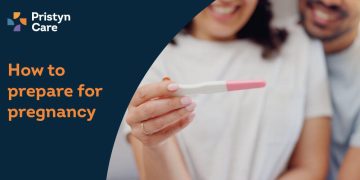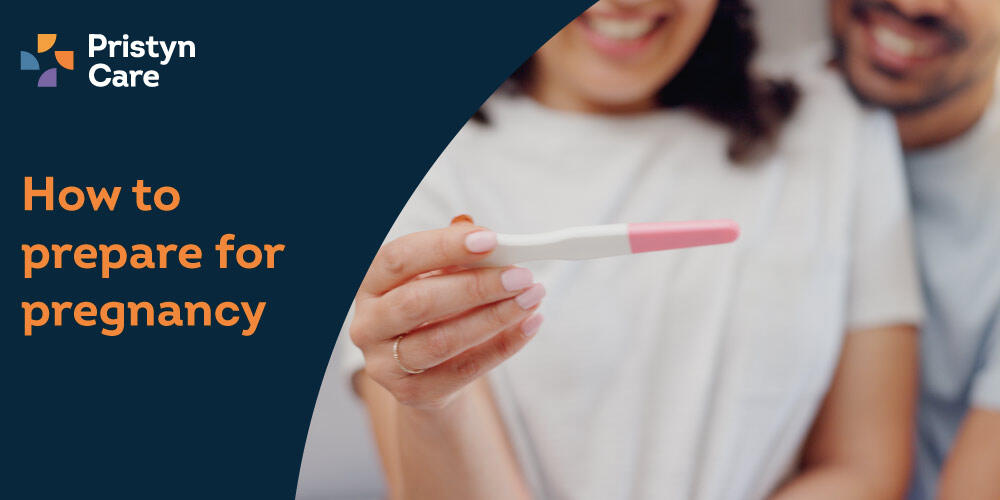![]() Views: 316
Views: 316
How To Prepare For Pregnancy
Let's embark on this enlightening path to ensure a healthy and joyous journey into parenthood.
Dedicated Support at Every Step!
Our Doctors are available 24 hours a day, 7 days a week to help you!
Call Us0806-541-7961Table of Contents
Understanding Pre-Pregnancy Health: A Vital First Step
Before you see those two pink lines on the pregnancy test, understanding your pre-pregnancy health is instrumental. Preconception health is all about taking care of your health now to ensure you're in the best shape for a future pregnancy. It involves learning about any potential risks to you and your baby during pregnancy and how to manage them.
Firstly, schedule a preconception check-up with your doctor to assess your overall health. Based on your medical history, they may recommend certain screenings or medicines to help manage any chronic illnesses like diabetes or hypertension.
Key lifestyle changes are essential for preparing for pregnancy. Focus on a balanced diet rich in whole grains, fruits, vegetables, lean proteins, and healthy fats. To support foetal development, consider starting a daily supplement of folic acid at least a month before trying to conceive. Regular physical activity and managing stress are also crucial.
No Cost EMI, Hassle-free Insurance Approval
Preparing for Pregnancy After 30
Many women these days plan to start their families after the age of 30. If you fall into this category, don't fret! With a few additional steps, you can prepare your body for pregnancy even after crossing the 30-year mark. Here’s how to prepare for Pregnancy after 30:
- Arrange a preconception checkup for early detection and management of age-related health issues
- Focus on nutrition
- Maintain a healthy weight
- Commit to at least half an hour of moderate physical activity
- Adopt stress management techniques
How Should a Male Prepare for Pregnancy?
Preparation for pregnancy not only involves women but also men, as their health plays an essential role in fertility and the future child's well-being. Here are some critical steps on how should a male prepare for pregnancy:
- Schedule a Preconception Check-up: Like women, men should consult a doctor to review their overall health status.
- Achieve a Healthy Weight: Maintaining an ideal body weight is vital, as obesity could lead to poor sperm quality and fertility issues.
- Avoid Harmful Substances: Men should refrain from smoking, limit alcohol consumption, steer clear of recreational drugs like marijuana and anabolic steroids, and reduce exposure to environmental toxins such as pesticides and heavy metals.
- Manage Stress and Mental Health: Stress-relieving activities like physical exercise, meditation, or hobbies can prove beneficial.
- Educate Yourself: Familiarise yourself with your partner's health history and discuss any potential genetic concerns to ensure a healthier pregnancy outcome.
Important Tips To Prepare For Pregnancy
Getting ready for a baby starts long before you conceive. Here are some steps on how to prepare for a baby before pregnancy:
- Preconception Checkups: These checkups will allow your doctor to review your medical history and any ongoing conditions and medications to ensure you're physically prepared for pregnancy.
- Take Folic Acid: This vital nutrient is instrumental in protecting your future baby from neural tube defects.
- Achieve a Healthy Weight: Both underweight and overweight conditions can pose challenges for mother and baby.
- Eat a Balanced Diet: A diet rich in whole grains, fruits, vegetables, lean proteins, and healthy fats is vital to support your nutritional needs and prepare your body for pregnancy.
- Exercise Regularly: Regular moderate exercise of at least 30 minutes on most days can improve your fitness and manage stress, positively impacting fertility.
MBBS, Diploma in Radio Diagnosis & MD-TB & Respiratory Diseases
₹1200₹600Consultation Fee
MBBS, Diploma in Ophthalmologist, MS-Ophthalmologist
₹1200₹600Consultation Fee
The Use of Preparation H During Pregnancy
When you're pregnant, even common issues like haemorrhoids need special consideration. Preparation H is a topical medication often used to relieve discomfort from haemorrhoids, such as itching, burning, or discomfort; however, it is crucial to understand these points.
- Consult your doctor before using preparation H
- Review the ingredients
- Watch for side effects or allergic reactions
- Your doctor might suggest other treatments or lifestyle changes
Preparing for a Glucose Tolerance Test During Pregnancy
A glucose tolerance test (GTT) is a vital tool used during pregnancy to assess your body's ability to process sugar. This test is primarily used to identify gestational diabetes, a condition that could have implications for both mother and baby.
Here are some key steps for preparing for a GTT during pregnancy:
- Understand the Testing Process: The GTT is typically carried out between the 24th and 28th weeks of pregnancy. It begins with a one-hour screening, followed by a more detailed three-hour test, if necessary.
- Dietary Preparation: While you are allowed to eat normally before the one-hour test, it's best to avoid foods high in sugar on the day of the test. Before the three-hour test, you should consume a balanced diet with at least 150 grams of carbohydrates daily for three days. This helps stabilise your blood sugar levels.
- Fasting Requirements: You will need to fast for 8-12 hours before the three-hour GTT, which means not consuming any food or drink apart from water during this period.
- Drinking the Glucose Solution: On the day of the test, you will gulp down a glucose solution. Your blood will then be sampled at intervals (usually at 1, 2, and 3 hours) to measure your blood sugar levels.
- Communication with Your Doctor: Inform your doctor about any medications you are taking or any health conditions that may affect your results.
How to Prepare Your Body for Pregnancy After Miscarriage
Experiencing a miscarriage can be emotionally devastating and physically draining. However, it's important to remember that it doesn't mark the end of your journey towards parenthood. Here's how you can prepare your body organically for pregnancy after a miscarriage:
- Allow Time for Healing: After a miscarriage, give your body time to recover both physically and emotionally. Most doctors recommend waiting at least one normal menstrual cycle before trying to conceive again, but this varies based on individual circumstances.
- Consult Your Healthcare Provider: Make sure to schedule a follow-up appointment so that your doctor can address any concerns and ensure that your body is ready for another pregnancy.
- Focus on Nutrition: Consuming a balanced diet rich in vitamins, minerals, folic acid, iron, and calcium is crucial for restoring your body and preparing it for a healthy pregnancy.
- Managing Stress: Dealing with the emotional aftermath of a miscarriage is as important as physical healing. Engage in activities such as yoga, meditation, or counselling to reduce stress and build resilience.
- Maintain a Healthy Lifestyle: Regular exercise, adequate sleep, and hydration are vital for overall well-being and for enhancing mood and energy levels.
In conclusion, preparing for pregnancy—whether it's getting ready for a glucose tolerance test or recuperating from a miscarriage—requires knowledge, patience, and care. Remember to always keep an open line of communication with your healthcare provider throughout your journey towards parenthood. After all, every journey is unique, and every step you take brings you closer to meeting your baby.
FAQs
- How can I prepare my body before getting pregnant?
Preparing for pregnancy involves several steps. Focus on maintaining a healthy weight, consuming a balanced diet rich in essential vitamins and minerals, and engaging in regular exercise. Consult your doctor for a preconception check-up and start taking prenatal vitamins with folic acid to support the baby's development.
- When should I start preparing for pregnancy?
Ideally, start preparing for pregnancy at least three to six months before you plan to conceive. This time frame will help you make necessary changes to your lifestyle, schedule medical appointments, and ensure your body is in its best shape for pregnancy.
- How can I increase my chances of getting pregnant?
To increase your fertility, track your menstrual cycle to identify your most fertile days, have regular unprotected sex during this window and maintain a healthy lifestyle. Reducing alcohol consumption, quitting smoking, and managing stress can also enhance fertility.
- How do I make sure my sperm stays inside?
After intercourse, lie down for about 10-15 minutes without going to the bathroom. This brief period allows the sperm to travel towards the cervix, increasing the chances of fertilisation.
- How do you plan for a first baby?
Planning for your first baby involves numerous steps - discussing family goals with your partner, evaluating financial readiness, and preparing emotionally and physically. Creating a timeline for conception and considering lifestyle changes or medical consultations are also crucial.
- What is the right age to plan for pregnancy?
The ideal age for pregnancy varies with each individual's circumstances. Generally, women are most fertile in their late 20s and early 30s. However, with proper preparation, many women successfully conceive in their late 30s or early 40s.
- How can you conceive a baby girl 100%?
While there is no proven method to guarantee to conceive a baby girl, some suggest timing intercourse before ovulation and following specific dietary practices. These methods lack scientific evidence and should be considered cautiously.
- How do I ensure I have healthy sperm?
To maintain healthy sperm production, men should avoid excessive heat exposure like hot tubs, limit alcohol consumption, quit smoking, and maintain a balanced, antioxidant-rich diet. Regular exercise also supports overall reproductive health.
- What to do before conceiving?
Before attempting to conceive, ensure you are in good health. Schedule a preconception check-up, start taking prenatal vitamins with folic acid, maintain a balanced diet, and avoid harmful substances like tobacco and excessive alcohol.
- What is ovulation day?
Typically, ovulation day occurs about 14 days before the start of your next menstrual period in a regular cycle. This is when an egg is released from the ovary, creating the most fertile window for conception.










